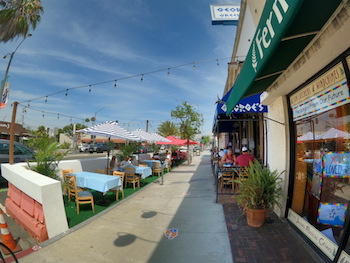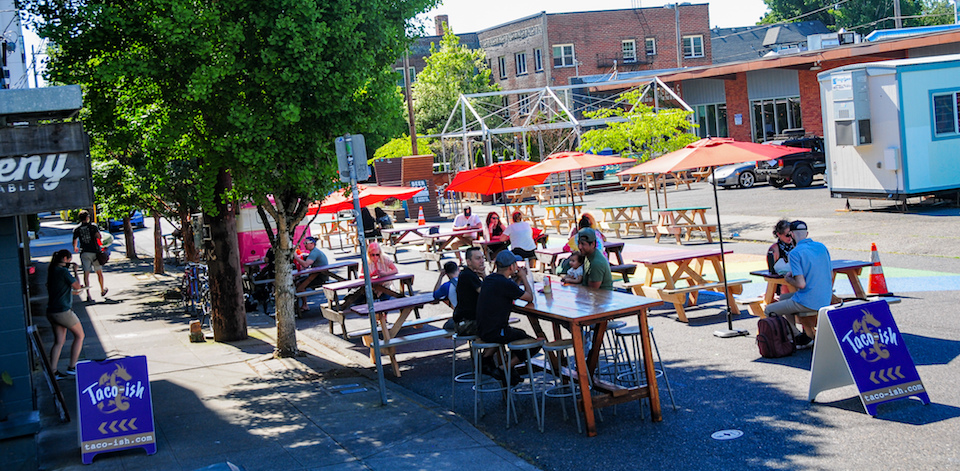The COVID-19 crisis has amplified the existing crisis of racial inequity, and pandemic response is inextricably linked with the fight for racial justice. As cities across the US begin to ease restrictions on non-essential travel and businesses, and implement projects and policies designed for recovery, we cannot return to a pre-pandemic normal that disinvested in communities and exacerbated economic and racial inequities. For a just recovery, we must center the needs of those disproportionately harmed by COVID-19’s health, economic, and social impacts and seek equitable outcomes in transportation decision making.
During this crisis, many community organizations have been engaging with their members and neighborhoods and are clear on what they need to address urgent issues. Meanwhile, city staff are equipped to design and implement projects in the public right-of-way, as well as navigate government procedures and processes. Working together, city agencies and community-based organizations are well poised to navigate the tension between the speed required for emergency pandemic response, and the thoughtfulness required to ensure that rapid project delivery doesn’t further perpetuate inequity or harm communities most in need of support.
To support cities as they adapt public space to provide health services information to residents, create space for safe mobility, and bolster local economies, NACTO has awarded grants of $25,000 to ten community-based projects through the Streets for Pandemic Response and Recovery program. These projects represent a wide range of response actions in NACTO member cities across the US.
 Two of the grant recipients identified that there was a lack of public space for youth to sit, study, and play. In Detroit, the City will work with local organizations in three neighborhoods to create People Streets for Learning uniquely designed to provide youth programming and respond to specific needs in those communities. The City of Alexandria and a local partner organization will create a WiFi-enabled public space for students to sit and study, and for the larger community to receive services that were interrupted during the pandemic.
Two of the grant recipients identified that there was a lack of public space for youth to sit, study, and play. In Detroit, the City will work with local organizations in three neighborhoods to create People Streets for Learning uniquely designed to provide youth programming and respond to specific needs in those communities. The City of Alexandria and a local partner organization will create a WiFi-enabled public space for students to sit and study, and for the larger community to receive services that were interrupted during the pandemic. 
Several of the grant recipients recognized that despite efforts to widely disseminate information about permits for open air dining or other activities, businesses in low-income communities and communities of color are vastly underrepresented in permit applications. In Denver, Philadelphia, Long Beach, and Portland, city agencies will apply the grant funds to work directly with local partners to create targeted outreach campaigns and provide design, build, and materials support to local businesses in these communities.
The final four recipients are repurposing public space to support improved mobility, while providing additional COVID-specific services. New York City DOT will transform underutilized space under the A train line to improve access to transit and create a health information hub for the neighborhood. Similarly, Atlanta DOT will close streets and lanes near transit facilities to improve walkability, bikeability, and transit access, and will provide information hubs in the newfound street space. Durham is working closely with community partners to fully understand what residents in East Durham want from the city’s Calles Compartidas, and will support these neighborhoods as they design and build streets that feel safe and inclusive. And in Minneapolis, the Department of Public Works will expand their definition of Mobility Hub to mean not just a place where people can access multiple transportation modes, but rather a place where residents can find resources and information that have been slowed or stopped during the pandemic.
You can find out more about each project below, and you can find NACTO’s Streets for Pandemic Response and Recovery resource online. And please, keep following for updates here, on Twitter, and on Instagram.
NACTO Member: City of Alexandria
Community Partner: Casa Chirilagua
Project Name: Bridging the Digital Divide in Arlandria’s Public Space
The City of Alexandria is partnering with Casa Chirilagua (Casa) to build a safe, comfortable, and WiFi-connected outdoor space for students to study in Arlandria, a neighborhood where many households don’t have access to reliable Internet. The outdoor public space is located adjacent to Casa, an organization that provides family support services, after-school tutoring, language programs, and computer literacy classes. Limited in the services they can provide indoors during the pandemic, Casa will utilize this new public space to meet with families, teach classes, and support this neighborhood in need.
NACTO Member: Atlanta Department of Transportation (ATLDOT)
Community Partners: Georgia STAND-UP, TransFormation Alliance
Project Name: Pop-up Information and Public Health Resources Sharing
The Atlanta Department of Transportation is partnering with Georgia STAND-UP and TransFormation Alliance to convert several streets in SW Atlanta, starting with the West End MARTA Station, into COVID information hubs. In addition to providing critical information to communities heavily impacted by the pandemic, the street and lane closures will also provide space for essential workers in these communities to safely walk, bike, and access transit.
NACTO Member: Denver Department of Transportation and Infrastructure (DOTI)
Project Name: Patio Expansion Initiative for COVID (PEIC)
After the city’s rollout of a patio expansion program to allow restaurants to extend outdoor seating into the public right of way, very few businesses in Denver’s equity areas have applied. With this grant, DOTI will provide technical assistance and materials to small businesses in Westwood and East Colfax, two neighborhoods that have been disproportionately impacted by COVID-19 and historical redlining. This support will bolster women and minority owned small businesses that have little operating cushion and are especially vulnerable during the pandemic.
NACTO Member: City of Detroit
Community Partners: Urban Neighborhood Initiatives (UNI), Brilliant Detroit
Project Name: Streets for People Streets for Learning
The City of Detroit is working with two community-based organizations to temporarily close streets near neighborhood schools and parks in Southwest, Cody Rouge, East (Osborne), and the North End to create outdoor community hubs for young people and other residents. These partners will each program their own spaces tailored to the needs of the specific community where they are based, focusing on creating outdoor learning space, providing childcare, hosting enrichment activities, and creating street art.
NACTO Member: City of Durham
Community Partner: SpiritHouse
Project Name: Calles Compartidas
The City of Durham is partnering with a community-based organization, SpiritHouse, to engage residents of East Durham in the development of Shared Streets/Calles Compartidas in the community. Residents will work closely with SpiritHouse to describe what makes a Shared Street feel safe and inclusive, and the City of Durham, in partnership with SpritHouse and local residents, will incorporate art, culture, recreational equipment, and signage on the street. Ultimately, these streets will provide open recreation space for Durham residents who have been disproportionately impacted by COVID-19.
NACTO Member: Long Beach
Community Partner: The Long Beach Conservation Corps
Project Name: Mom and Pop Parklet Program
In the midst of rising coronavirus cases across California and a roll-back of indoor dining, local restaurants in Long Beach are reliant on outdoor seating to remain afloat. While restaurants across the city face the same existential need, most of the businesses taking advantage of the City’s existing parklet assistance program are concentrated in business districts and more affluent neighborhoods. This grant will allow Long Beach and its local partners to focus on small businesses in four historically underserved communities, providing translated outreach materials for the parklet program and funding to small businesses for the construction of inviting spaces for outdoor dining in public rights-of-way.
NACTO Member: City of Minneapolis Public Works
Project Name: 2020 Mobility Hub Pilot
The City of Minneapolis Department of Public Works is expanding the defined use of Mobility Hubs beyond being a place where people can connect to multiple modes of transportation safely and conveniently. In this year’s pilot, the City expanded the number of locations in their Mobility Hub program and is now pivoting hub usage to respond to the new needs of the community due to COVID-19 and civil unrest. The City will be working with local community partners to identify the evolving needs of the low income neighborhoods disproportionately impacted and use the Hubs as a neighborhood level distribution point.
NACTO Member: New York City Department of Transportation (DOT)
Community Partner: Rockaway Initiative for Sustainability & Equity (RISE)
Project Name: RISE for the Rockaways: A Rapid Response for an Equitable Recovery
New York City DOT is partnering with RISE to transform underutilized space under the elevated A train line into a “recovery corridor” in Far Rockaway, a neighborhood in Queens that has the second-highest coronavirus death rate in the city. The transformation will allow greater connectivity to transit and community facilities, provide space for COVID testing and information distribution, and create outdoor seating for public programming.
NACTO Member: Philadelphia oTIS
Project Name: Addressing Racial Inequity in Philadelphia’s COVID-19 Outdoor Dining Program
Philadelphia restaurants located in neighborhoods with predominantly non-white residential populations are underrepresented in the City’s outdoor dining program. With this grant, the City of Philadelphia will work with local restaurants in communities of color to address two issues: first, identify shortcomings in the program and address racial inequities that are creating hurdles for businesses in predominately non-white neighborhoods; and second, work with businesses in these communities that are located on federally regulated roadways by developing creative solutions for repurposing street space while remaining compliant with federal guidance.
NACTO Member: Portland Bureau of Transportation (PBOT)
Project Name: Black-Centered Spaces for Community and Business in Albina
The Portland Bureau of Transportation is expanding their Frontline Communities Partnership Program (FCPP) to provide resources to businesses in the Albina neighborhood as they create physically distant spaces for business activities. Since the start of the pandemic, the FCPP has focused on engaging community partners to inform and strengthen PBOT’s COVID-19 response. Working directly with local partners in Albina, PBOT will support BIPOC-owned businesses in this historically Black neighborhood to design and build open spaces that will allow for safe shopping and eating, while incorporating public art and youth programming into the design of the spaces.
 Photo: Jonathan Maus/BikePortland
Photo: Jonathan Maus/BikePortland